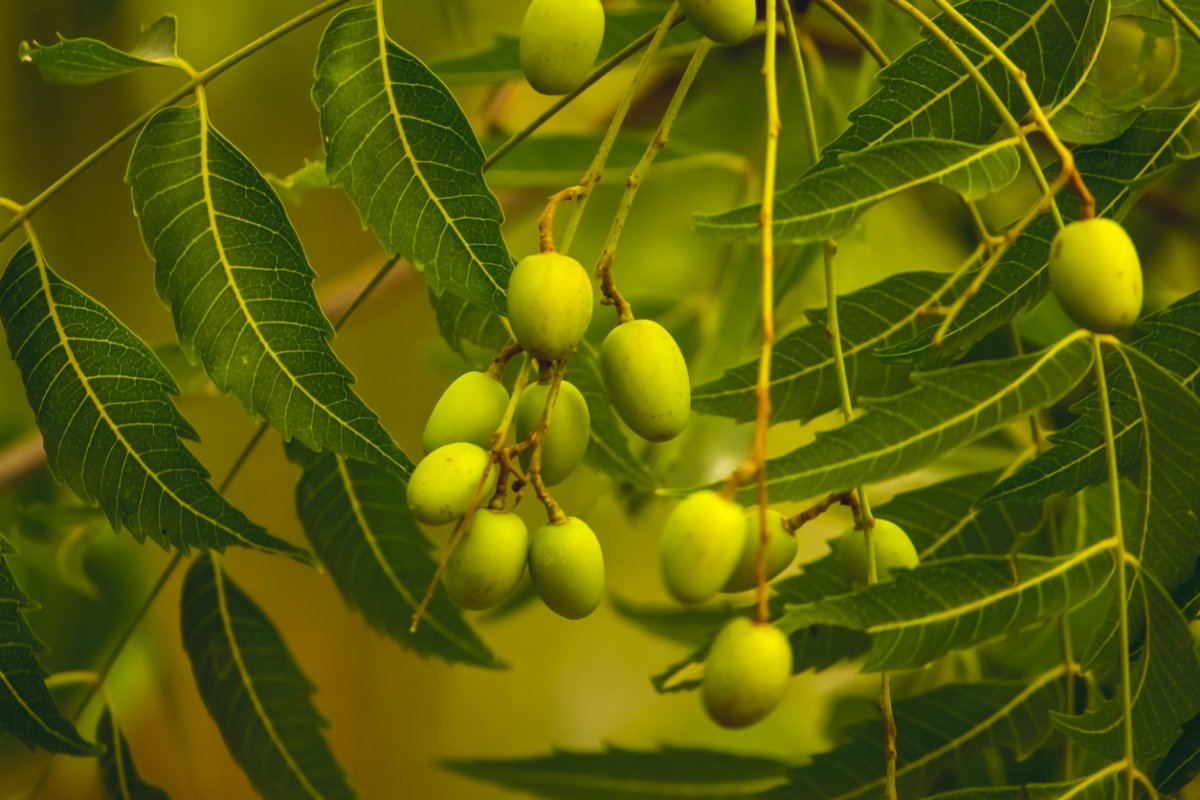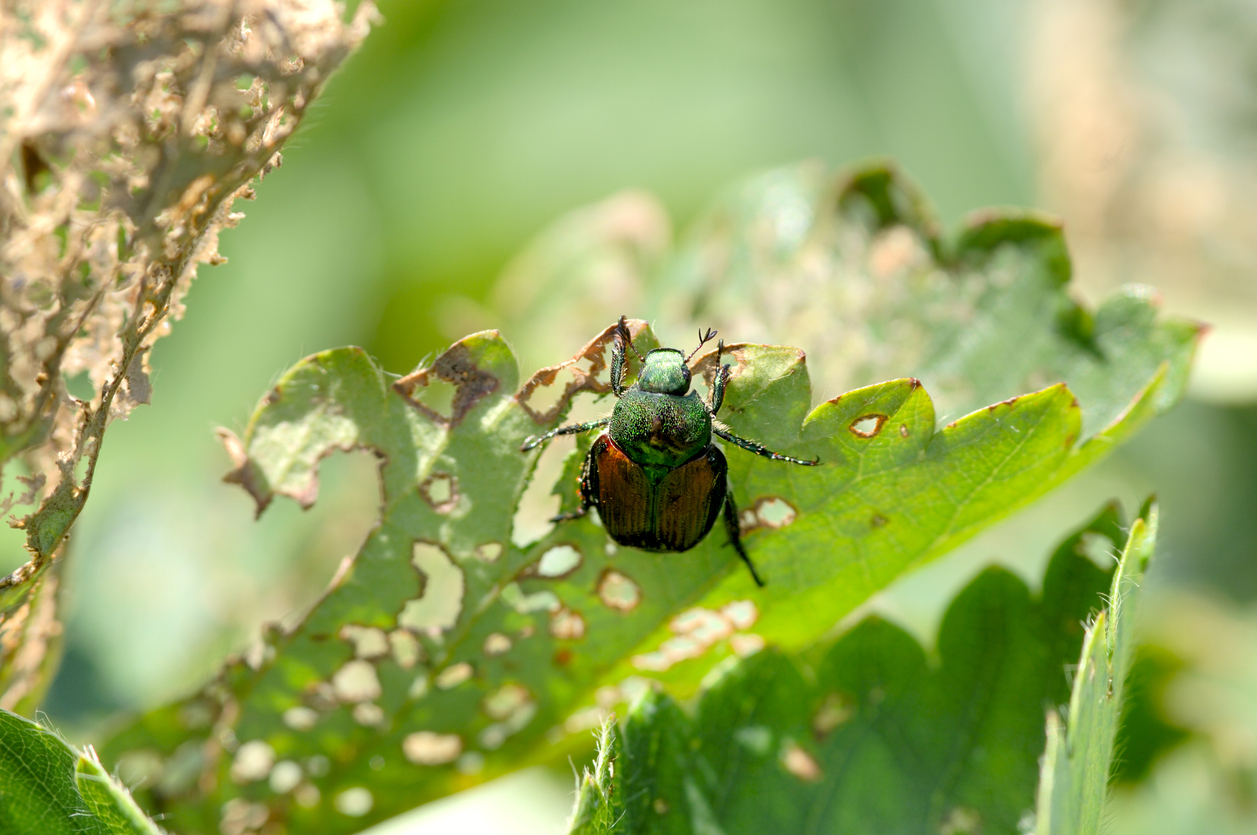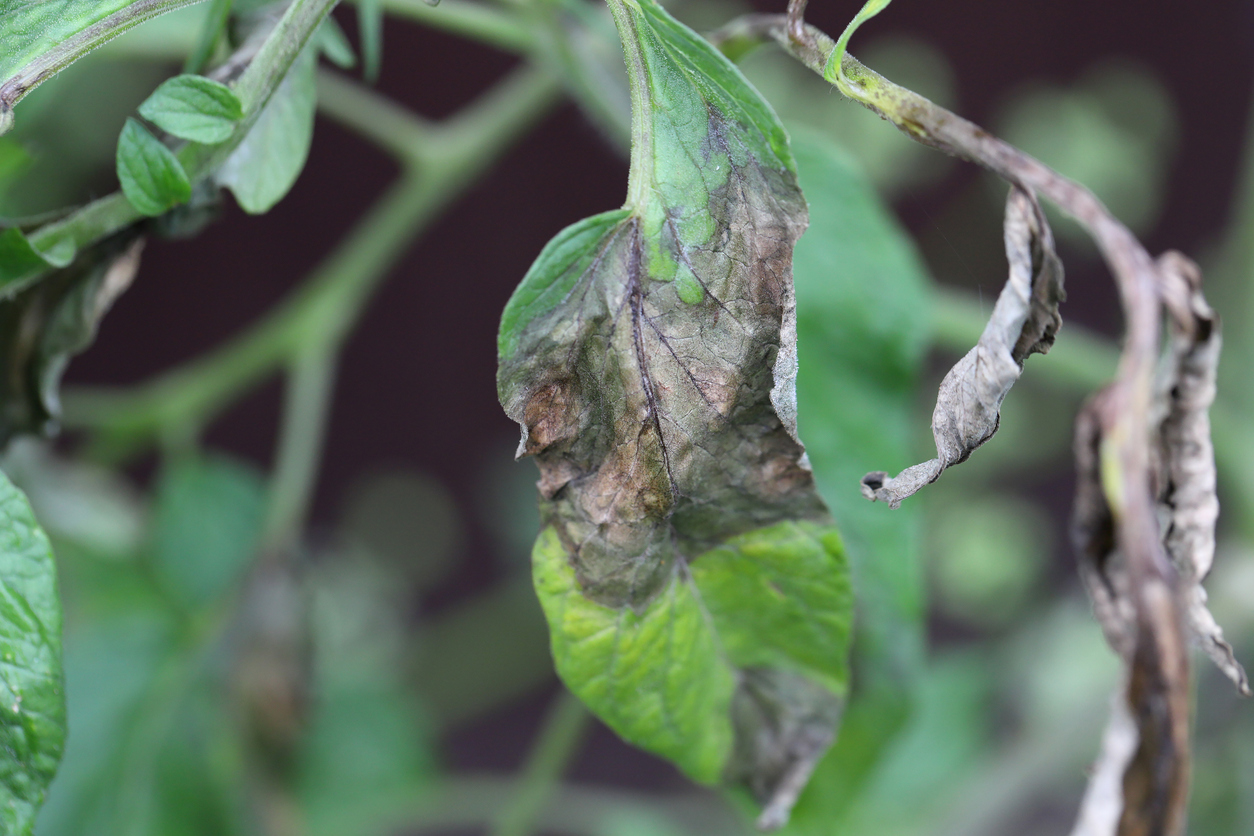

We may earn revenue from the products available on this page and participate in affiliate programs. Learn More ›
Neem oil comes from the seeds of the neem tree (Azadirachta indica), a fast-growing member of the mahogany family native to southeast Asia. Typically expressed via a cold-pressing process, the oil is dark yellow in color and has a garlic-like odor.
Neem oil is used as an organic pesticide that kills a number of leaf-eating insects. Happily for gardeners, neem oil is typically harmless to beneficial bugs that don’t eat leaves, including pollinators, ladybugs, and earthworms.
Neem oil is also an effective fungicide and bactericide. It (and pesticide products containing the oil) can be irritating to human skin and eyes, so they’re best used with care. You may see beauty products containing neem oil; these have been formulated to remove the components of neem oil that are irritating.
Many gardeners know that neem oil is an effective natural pest control product, but might want to consider the multiple applications for this oil not only in the garden, but also within the home. Here are some neem oil uses for outside and inside.
What to Consider When Buying Neem Oil
Neem oil is an effective and multipurpose oil for a variety of applications. When purchasing neem oil, however, there are a few things to consider to ensure you’re selecting the best oil for your needs:
Type: Determine whether you need to buy pure neem oil, a diluted solution, or one specifically formulated for a particular application. There are potential risks associated with neem oil, including skin and eye irritation if used incorrectly. Always follow the manufacturer-recommended instructions and conduct a patch test before use.
Toxicity: Though pure neem oil can irritate skin, it is generally safe to use for most applications. However, it is toxic to fish and other aquatic life. Be mindful of disposing of neem oil properly, and adhere to local regulations so that you don’t harm wildlife.
Organic: If you prefer to use natural products, check the product’s label to see whether it’s certified organic.
Packaging: Neem oil and other oils should always be packaged in dark glass recyclable bottles to protect it from air and light exposure, which can impair effectiveness over time.
Odor: Neem oil is known for its strong and pungent odor. Be sure this is acceptable for your intended use.
Two of our favorite neem products for the yard include Plantonix’s Neem Bliss and Bonide’s Captain Jack’s Neem Oil, both of which are suitable for organic gardening.
1. Banish Bugs

Neem oil is effective against numerous insects, including aphids, mealybugs, spider mites, thrips, squash bugs, and whiteflies. Unchecked, these tiny pests can do a lot of damage. One of the main components of neem oil, azadirachtin, adversely affects insect hormones that enable growth and reproduction. Applied directly to bugs, neem oil can suffocate them.
RELATED: How To Get Rid of Scale on Plants
2. Control Nematodes
There are many species of nematodes, but the ones that bother plants are microscopic. While they’re related to roundworms, the nematodes in your garden aren’t a human threat. However, they can do a number on plants by damaging stems, roots, leaves, and flowers. They also spread disease. Neem oil can help combat destructive nematodes by putting a damper in the reproductive process.
Be aware not all nematodes are bad news; some can improve the soil and eat their unlikable cousins.
3. Ward Off Overwintering Insects
It’s bad enough dealing with insects during the growing season. But even if you manage to kill insects in the summer, many overwinter and come back with a vengeance. Use neem oil on dormant plant life to prevent overwintering pests from surviving and eggs from hatching in the spring. While some pesticides only work on pests at specific times during their lifecycle, neem oil can kill bugs at various stages.
4. Control Lawn Grubs

Japanese beetles can seriously damage a lawn in their larval form, and when they mature, they’re capable of devastating food crops and ornamentals. The best way to target these hungry insects is to prevent them from setting foot on your lawn in the first place. Spraying the grass with neem oil keeps beetles from laying eggs, so grubs never show up to destroy your lawn.
5. Indoor Plant Protection
Neem oil is also incredibly useful for controlling houseplant pests. Even with careful inspection, it’s possible to bring pest-ridden plants into the home inadvertently. Understandably, many people have doubts about using pesticides inside, but neem oil is safe to use indoors. Simply spray the leaves regularly to control insect populations and prevent disease. Because neem oil is nontoxic, there’s no need to worry about the safety of children or pets.
RELATED: 14 Symptoms of an Unhappy Houseplant (and How You Can Treat Them)
6. Go-to in the Greenhouse
Similarly, you can also use neem oil to control pest and disease outbreaks in a greenhouse. The closed environment of a greenhouse is ideal for pest proliferation. People are hesitant to spray highly toxic chemicals in an enclosed space, like a greenhouse, for obvious reasons. Neem oil serves as a viable alternative for indoor control of common greenhouse pests, like aphids and mites.
7. Fungicide

Fungal infections can be challenging. Many are incurable and, over time, stress plants so severely that they eventually die off. However, neem oil is an excellent fungicide that can both prevent and remove fungal infections from infected plants. It’s effective on fungal diseases like powdery mildew, leaf spot, rust, and scab. To get rid of a fungal disease, regularly spray the affected plant weekly until the infection is gone. Regular spraying also helps prevent fungal disease.
8. Bactericide
Killing pests is only half the battle. Many insect infestations also bring disease, including bacterial infections like fire blight. To combat this disease, which causes severe wilting and leaf burn, spray affected plants with neem oil during their dormant phase. Make sure to spray the plants all over to prevent the disease from overwintering.
RELATED: Solved! When Is the Best Time of Year for Spraying Fruit Trees?
9. Keep Mosquitos Away
Ouch! Mosquito bites are unpleasant, and they can also spread diseases like West Nile Virus. To keep mosquitoes away, you should inspect your property for evidence of standing water. Mosquitoes breed in these spots—often hidden from view. An additional tool for an anti-mosquito arsenal is neem oil. Spray neem oil insecticide on plants around your deck or patio area to discourage mosquitoes from hanging around. Additionally, specially formulated neem oil can be applied to the skin to ward off these biting pests.
10. Cleaning Solution
Neem oil isn’t just for the outdoors: It’s a practical cleaner for inside your home, too! Thanks to its antibacterial properties, it can be useful for tackling grime and germs on your most-used surfaces without having to use harsh chemicals. To whip up a neem-based household cleaner, mix a few drops with hot water, 1 ½ tablespoons of liquid castile soap, and 6 drops of pine or eucalyptus oil in a spray bottle. Wipe down kitchen grease and other stains, and keep your home squeaky clean with this simple, eco-friendly concoction.
RELATED: 13 Surprising Pantry Items That Naturally Clean and Freshen Your Home
11. Polish Furniture

If your favorite chaise lounge needs a little TLC, neem oil can help. It’s a fantastic natural furniture polish, especially on treated or untreated wooden pieces, and can help bring out the wood’s natural shine while creating a protective layer against bugs and moisture. Simply mix a little neem oil with linseed oil or coconut oil, apply it to your wooden furniture using a soft dry cloth, and say hello to its new glossy finish. Note: Avoid using neem oil on delicate antique furniture with original finishes as it can ruin its patina.
12. Lice Treatment
Got lice? Specifically formulated neem oil can be the secret weapon to getting rid of these pesky creatures. The best part? It’s a natural and effective treatment that doesn’t involve the harsh chemicals that traditional lice treatments may contain. Apply the neem oil to your scalp and hair. Leave it in for at least 30 minutes (no more than an hour) and, section by section, thoroughly comb through the hair to remove dead lice. Wash the oil out with a shampoo.
13. Trash Can Deodorizer

Mask the stinky odors coming from your trash can with neem oil. Simply add a few drops to a cotton ball and toss it into the bottom of the can to eliminate unpleasant smells and freshen up your home with a pleasing, earthy scent. Plus, it’s green and nontoxic, unlike many household air fresheners.
RELATED: Does Your Home Smell Funny? 12 Odors That Could Mean Big Trouble
14. Pet Care
Neem oil can protect your pet against fleas, ticks, and other critters. A little goes a long way as it can help soothe their skin and prevent any itchiness, especially during the summer months. Mix 1 cup of neem oil with 4 cups of water. Simmer for five minutes, allow it to cool, and pour it into a spray bottle to use topically every day. Alternatively, you can add 1 1/2 tablespoons of neem oil to 13 ounces of shampoo and apply it to your furry friend’s coat during bath time.
